
Imagen propiedad de @lanzjoseg
Español
La Hallaca, Olores y Sabores de Tradición
El tema de la Gastronomía es sin duda apasionante por ser el resultado de procesos históricos, siendo el cúmulo de conocimientos legados de forma generacional que se han enriquecido con cambios en los procesos y tecnología convirtiéndose en el Patrimonio Cultural Inmaterial de los pueblos.
El comer está más vinculado a una cuestión de identidad y calidad de vida que de sobrevivencia, brinda características del lugar en el que se prepara al conocer los ingredientes presentes en sus recetas, es por ello que las especificaciones gastronómicas de cada región son tan importantes.
Adicional a esto, la gastronomía está asociada a las Manifestaciones Tradicionales, de hecho, diversas culturas preservan su sentido de identidad basándose en los valores de la alimentación.
Según la Organización de las Naciones Unidas para la Educación, la Ciencia y la Cultura (UNESCO), la gastronomía es una de las más importantes expresiones culturales y de acuerdo con estudios de este organismo, el nivel cultural de los pueblos se mide por tres criterios: cocina, cerámica y música.
Ahora bien, en el caso de Venezuela, la Gastronomía esta representada por una rica variedad de platos que se diferencian según la región y cuenta con preparaciones emblemáticas que representan la herencia cultural, ya que en ellas se funden los aportes de los grupos indígenas, europeos y africanos.
Entre estas preparaciones emblemáticas se encuentra "La hallaca", plato principal de la cena navideña cuyo origen quizás no es el más alentador , puesto que surge de la necedidad y carencia de los aborígenes y africanos que en condiciones de esclavitud y/o servidumbre aprovechaban sobras de comida de la cocina de las haciendas para complementar su deficiente alimentación.
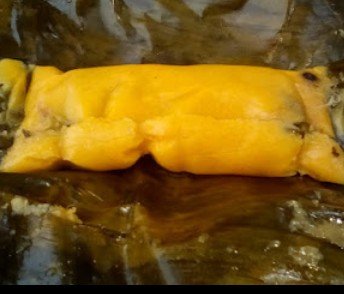
Fotografía de Maigualida Querales
Hoy en día no es sólo una hallaca, es el plato que reúne y organiza a la familia, desde la planificación del día en que se prepararán, salir a hacer las compras, afinar detalles del compartir que por lo general tienen lugar en casa de las abuelas y abuelos, en fin, el espíritu navideño enmarcado en la gastronomía y las deliciosas hallacas.
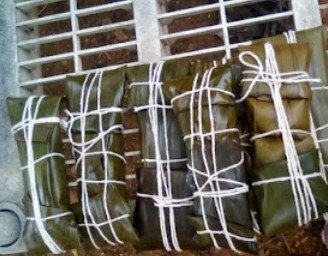
Fotografía de Maigualida Querales
Cada Región, Estado e incluso cada familia tiene su manera particular de prepararlas, los ingredientes varían, procesos de preparación, tiempos de cocción, formas de envolver y amarrar, tamaños, unos las prefieren cocidas en cocina a gas otros en leña, pero en esencia es la tradicional Hallaca Venezolana.
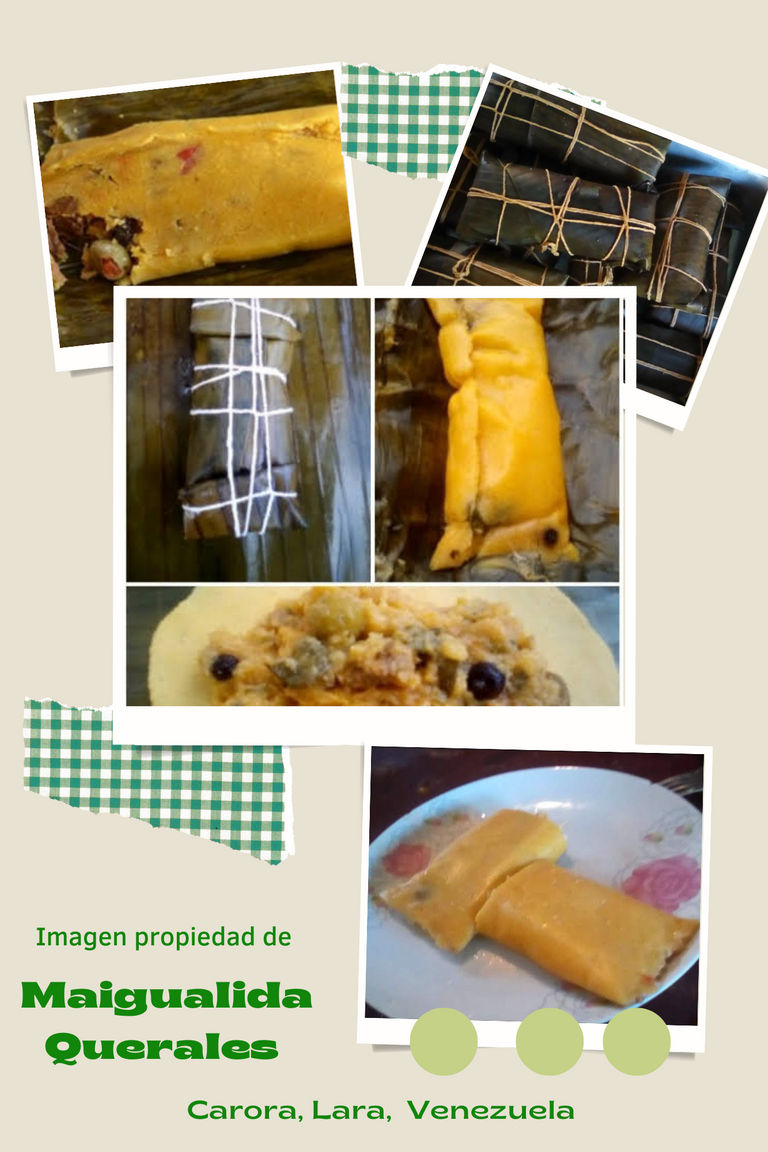
En este plato tradicional encontramos: maíz (harina o preparado tradicionalmente cocinando el maiz pilado/trillado, moliendo y amasando), carnes: res, pollo, gallina, cerdo, chivo, aceitunas, alcaparras, pasas, onoto, sal, zanahoria, papas, aliños verdes, aceite y hay quienes agregan queso rallado a la masa y otros las preparan con granos (frijoles), huevo sancochado, entre otros.
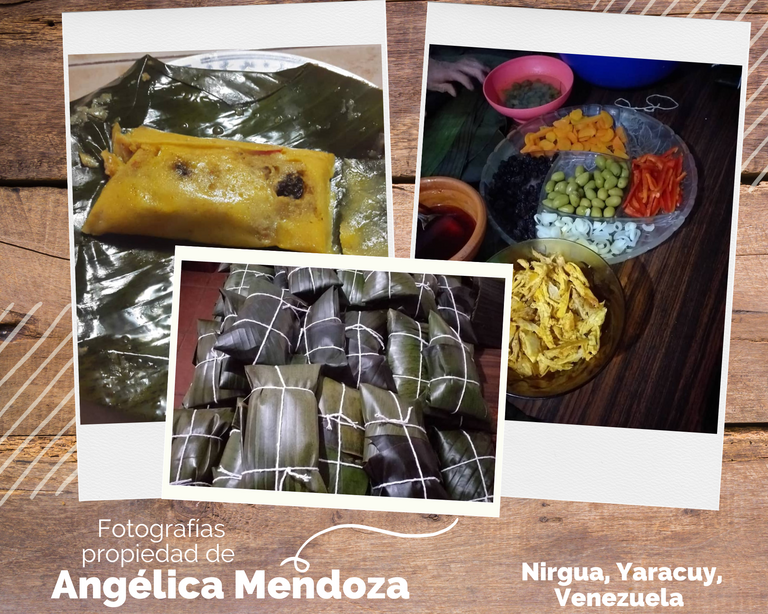
En este sentido, se hace pertinente revalorizar la preparación de este plato tradicional, así como de las diversas prácticas culinarias, tanto de sus ingredientes como el proceso de producción de los mismos y la preparación final del plato, los cuales son característicos de una región y han constituido un valor cultural a través de las generaciones, de manera que desde el conocimiento y amor por lo propio asumamos el compromiso de enaltecer y preservar nuestro Patrimonio Cultural Inmaterial Venezolano.
Gracias por tomar un tiempo para leerme.
Un gusto participar en esta semana.
Gracias @TopFiveFamily Concurso Observa, Piensa, Escribe.
Acá el link para los que deseen participar:

English
The Hallaca: Smells and Flavors of Tradition
The topic of Gastronomy is undoubtedly exciting for being the result of historical processes, being the accumulation of knowledge bequeathed generationally that have been enriched with changes in processes and technology becoming the Intangible Cultural Heritage of the peoples.
Eating is more linked to a question of identity and quality of life than of survival; it provides characteristics of the place where it is prepared by knowing the ingredients present in its recipes, which is why the gastronomic specifications of each region are so important.
In addition to this, gastronomy is associated with Traditional Manifestations, in fact, diverse cultures preserve their sense of identity based on the values of food.
According to the United Nations Educational, Scientific and Cultural Organization (UNESCO), gastronomy is one of the most important cultural expressions and according to studies by this organization, the cultural level of peoples is measured by three criteria: cuisine, ceramics and music.
Now, in the case of Venezuela, Gastronomy is represented by a rich variety of dishes that differ according to the region and has emblematic preparations that represent the cultural heritage, since they merge the contributions of indigenous, European and African groups.
Among these emblematic preparations is "La hallaca", the main dish of the Christmas dinner whose origin is perhaps not the most encouraging, since it arises from the need and lack of the aborigines and Africans who in conditions of slavery and/or servitude used leftover food from the kitchen of the haciendas to supplement their poor diet.

Photograph by Maigualida Querales
Today it is not only a hallaca, it is the dish that gathers and organizes the family, from planning the day it will be prepared, going out to do the shopping, fine-tuning details of the sharing that usually takes place at grandmothers' and grandfathers' homes, in short, the Christmas spirit framed in the gastronomy and the delicious hallacas.

Photograph by Maigualida Querales
Each region, state and even each family has its particular way of preparing them, the ingredients vary, preparation processes, cooking times, ways of wrapping and tying, sizes, some prefer them cooked in gas stove others in firewood, but in essence it is the traditional Venezuelan Hallaca.

In this traditional dish we find: corn (flour or traditionally prepared by cooking the corn, grinding and kneading), meats: beef, chicken, chicken, pork, goat, olives, capers, raisins, onoto, salt, carrots, potatoes, green dressings, oil and some people add grated cheese to the dough and others prepare it with grains (beans), boiled egg, among others.

In this sense, it is pertinent to revalue the preparation of this traditional dish, as well as the various culinary practices, both of its ingredients and the production process of the same and the final preparation of the dish, which are characteristic of a region and have constituted a cultural value through the generations, so that from the knowledge and love for our own we assume the commitment to enhance and preserve our Venezuelan Intangible Cultural Heritage.
Thank you for taking the time to read me.
A pleasure to participate in this week.
Thanks @TopFiveFamily Observe, Think, Write Contest.
Here is the link for those who wish to participate:
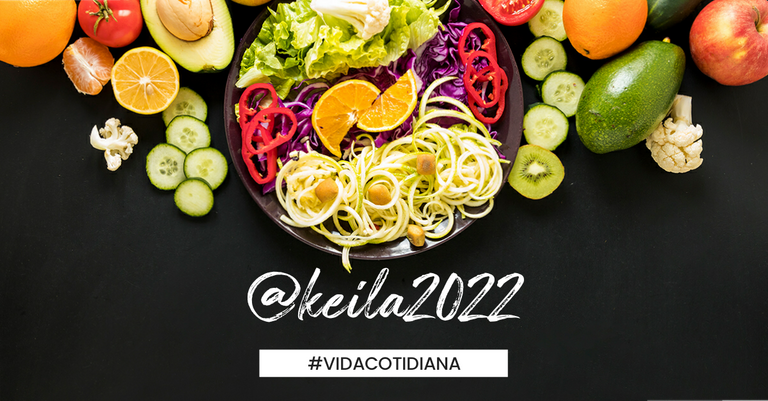
Con el apoyo de la familia.
Trail de TopFiveFamily
Congratulations @keila2022! You have completed the following achievement on the Hive blockchain and have been rewarded with new badge(s):
Your next target is to reach 40 posts.
Your next target is to reach 2250 upvotes.
You can view your badges on your board and compare yourself to others in the Ranking
If you no longer want to receive notifications, reply to this comment with the word
STOPTo support your work, I also upvoted your post!
Check out the last post from @hivebuzz:
Support the HiveBuzz project. Vote for our proposal!
Muy buena tu publicación. Gracias por compartirla
Leer tu post me da hambre... Conozco "la hallaca" de México, donde se llaman "tamales".
Saludos.
Gracias por leerme
Un placer compartir.
Abrazos